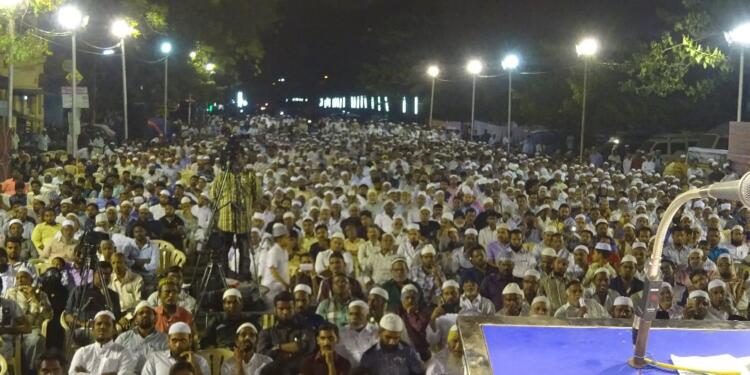With assembly elections due in 2026, Tamil Nadu’s Muslim-centric party, the Manithaneya Makkal Katchi (MMK), has stirred political waters by demanding 14 assembly seats for Muslims out of the 234 in the state. Led by Papanasam MLA MH Jawahirullah, MMK argues that Muslims make up 7.18% of Tamil Nadu’s population and deserve at least 10% of the total assembly seats to reflect fair representation. The party, which has traditionally attracted Muslim votes and holds influence in certain pockets of Tamil Nadu, believes this underrepresentation extends beyond state politics to Parliament and local bodies. The demand is being raised at a time when Tamil Nadu gears up for a high-stakes assembly battle in 2026, where alliance politics and identity assertion are set to play a key role.
Jawahirullah’s Track Record: Controversies and Anti-Hindu Rhetoric
Jawahirullah is no stranger to controversy. While he champions minority rights, he has often courted criticism for making remarks that hurt Hindu sentiments. Over the years, he has been accused of inciting communal disharmony and endorsing positions that are hostile to mainstream Hindu beliefs.
In 2023, Jawahirullah’s party erected banners that derogated Hindu gods and Bharat Mata to target the Modi Government on the Manipur violence. The banner showed caricatured images of Narendra Modi as Lord Ram and Amit Shah as Lord Lakshman holding bow and arrows standing on either sides of a naked woman (Goddess Sita), hinting at the horrific incident in Manipur in which a woman was paraded naked and sexually assaulted. After social media outrage he apologised for erection of such banners by his party cadres.
MMK has also faced accusations of tacitly supporting radical elements in the past and opposing government measures aimed at regulating religious conversions and maintaining communal peace. Critics argue that the party’s call for religion-based seat allocation is an extension of its divisive political strategy.
Allies Jostle for Space: DMK Front Faces Seat Pressure from Minority Voices
MMK is not alone in its call for increased minority representation. Other DMK alliance partners such as the Viduthalai Chiruthaigal Katchi (VCK), the Marumalarchi Dravida Munnetra Kazhagam (MDMK), and smaller Muslim outfits have all been pressing for a larger slice of the pie. This reflects the growing appetite among minority-based parties and social justice champions to secure their foothold in the legislative process.
As per the latest electoral roll, Tamil Nadu has over 6.3 crore voters. In the 2021 assembly elections, the DMK-led alliance swept to power with 159 out of 234 seats, with the DMK alone bagging 133 seats and 45.38% of the vote share. But as 2026 approaches, internal pressure is building within the alliance over candidate distribution, particularly from those representing Dalit and Muslim interests.
Annamalai’s Warning at Murugan Conference: No More Conversions, Protect Hindu Identity
Tamil Nadu BJP leader K. Annamalai, during the recently held Murugan Devotees Conference, raised serious concerns about the demographic shift being caused by increasing conversions and the global rise in the Muslim population. Annamalai warned that if unchecked, by 2050, Muslims could become the global majority.
“We must protect Hindu identity. No more conversions should be allowed under the garb of social outreach. Hinduism is under threat not just from external ideologies but also from internal complacency,” he said, drawing applause from the massive crowd.
He was responding directly to leaders like Jawahirullah, who downplayed demographic shifts and accused the BJP of fear-mongering. However, Annamalai maintained that the figures and projections were real and should concern every nationalist and devout Hindu in the country.
What Constitution Makers Intended: Religion-Based Reservations Not the Answer
The Constitution of India does not endorse religion-based reservations or seat allotments. Dr. B.R. Ambedkar and other framers of the Constitution were explicit in their intent to avoid communal electorates a system that once divided India before partition. The emphasis was on uplifting the socially and economically backward, irrespective of faith.
Granting seats solely on religious lines would not only contravene constitutional principles but could also reignite dangerous precedents. It risks segmenting society further and undermining the unity and secular framework of the democratic process. The demand by MMK is being seen by many as a slippery slope, one that could unravel the foundational ethos of the Indian Republic.
A Dangerous Precedent in the Making?
If MMK’s logic is applied, what stops other religious or caste groups from demanding fixed quotas in legislative bodies? What happens when every community demands representation strictly based on numbers? Such a trajectory could lead to balkanisation of electoral politics, further widening communal fissures in society.
While representation is vital, demanding it purely on religious lines poses a threat to the constitutional fabric. Tamil Nadu, known for its rationalist and inclusive politics, now faces the challenge of resisting communal polarisation. As 2026 approaches, parties will need to decide whether to uphold the spirit of democracy or give in to divisive vote-bank calculations.





















